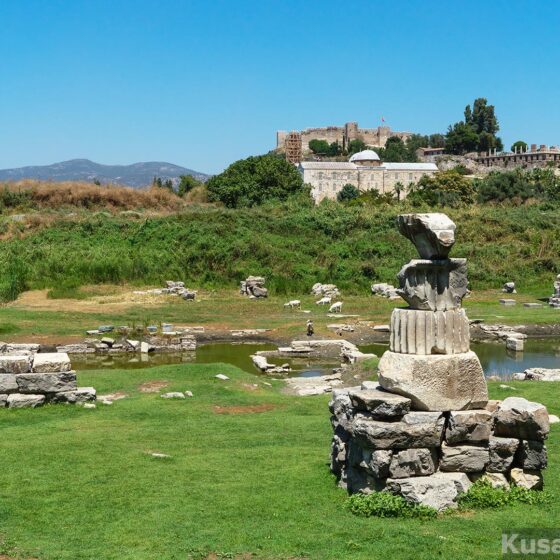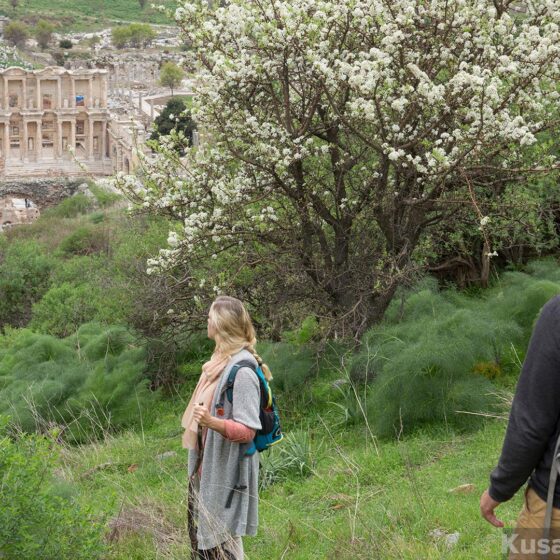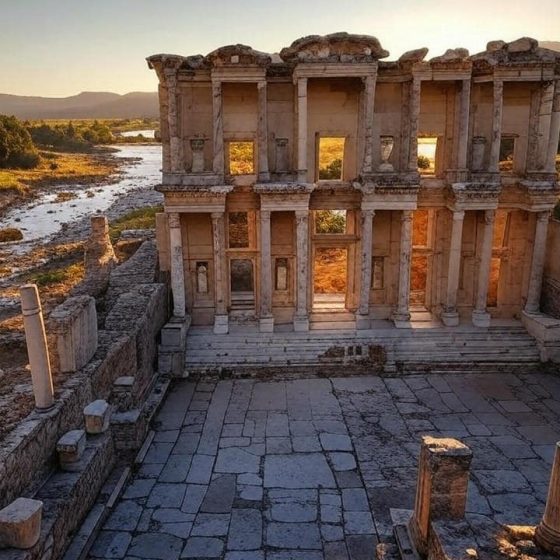Table of Contents Show
Imagine walking through the crowded streets of ancient Ephesus. The air is filled with the scent of fresh bread, spices, and burning oil lamps. Merchants call out to passersby, offering silk, olives, and fine pottery. Children run through the alleys, while craftsmen hammer away in their workshops. For the people of Ephesus, life was more than grand buildings and statues; it was about survival, work, family, and daily routines that shaped the city’s character.
What did an ordinary day look like? How did people earn a living? What did they eat, and where did they gather? This is a closer look at life behind the famous ruins.
Work and Trade: The Engine of the City
Ephesus was a place of opportunity, where people from different backgrounds made a living through trade, farming, and skilled work. The city’s location near the sea allowed ships from across the Mediterranean to bring goods such as wine, spices, and textiles. At the heart of this trade was the agora, a large marketplace where merchants sold everything from fine jewellery to exotic animals.
Not everyone was a trader. Many men worked as builders, sailors, and metalworkers. Some were employed in the city’s public baths, while others maintained the aqueducts that brought fresh water from the hills. Wealthier citizens owned farms outside the city, where slaves and hired workers grew wheat, olives, and grapes.
One of the most respected jobs was being a scribe—someone who could read and write, making them valuable for recording laws, contracts, and trade agreements. Few ordinary people had this skill, so scribes worked for officials, religious leaders, and wealthy merchants.
Daily Life: Home, Food, and Family
Most people in Ephesus lived in small, one or two-room homes made of mud bricks or stone. The wealthier class, however, lived in terrace houses, multi-story homes decorated with mosaics and marble floors. These homes had indoor plumbing, a luxury at the time, while poorer residents relied on public fountains for water.
Food was simple but fresh. Bread was a daily staple, often eaten with cheese, olives, and figs. Fish and seafood were common, thanks to the nearby coast, while meat was a luxury for most. In the evenings, families gathered around oil lamps to eat and talk, just as people do today.
Entertainment and Public Life
Ephesians had many ways to spend their free time. The city’s great theatre, which could hold up to 25,000 people, hosted plays, speeches, and even gladiator fights. Sports were also popular, with wrestling and chariot races drawing large crowds.
For those looking to relax, the public baths were a social hub. People bathed, exercised, and even discussed politics in these large, heated pools. Wealthier citizens might also visit private banquet halls, where they dined on roasted meats and fine wine while being entertained by musicians.
Religion and Festivals
Religious life was central to Ephesus. The city was famous for its devotion to Artemis, the goddess of fertility and hunting. Her temple, one of the Seven Wonders of the Ancient World, attracted pilgrims from across the Mediterranean. The annual Festival of Artemis was a grand event, filled with processions, sacrifices, and theatrical performances.
But Ephesus was not just a pagan city. It was also an early center of Christianity. The apostle Paul preached here, and the city is mentioned in the Bible’s Book of Revelation. By the late Roman period, Christianity had grown so much that many of the older temples were abandoned or turned into churches.
The Hidden Workers: Slaves and Servants
Like many ancient cities, Ephesus depended on slave labor. Slaves worked in homes, workshops, and fields, doing everything from cooking and cleaning to teaching children. Some were treated well and could buy their freedom, but many lived hard lives under strict masters.
The city also had many freedmen—former slaves who had gained their freedom. Some became successful traders or artisans, proving that social mobility was possible, even in the ancient world.
What Happened to the People of Ephesus?
Ephesus thrived for centuries, but as its harbour slowly filled with silt, trade declined. Earthquakes and invasions weakened the city, and by the Middle Ages, most of its people had left.
Today, only ruins remain, but they still hold the stories of the people who lived, worked, and built their lives there.
Last updated on February 15, 2025



